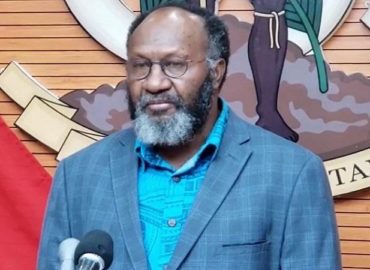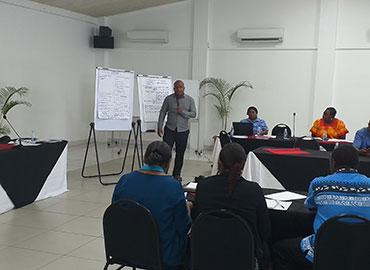COVID-19
Since the start of the COVID-19 outbreak, WHO has worked with countries and areas in the Western Pacific Region on public health measures to slow or stop the spread of the virus. World Health Organization in the Pacific has been working closely alongside Pacific Governments and Ministries of Health, in collaboration with partners, to make sure that countries are well prepared to respond to the threat of COVID-19.
Through a COVID-19 Pacific Joint Incident Management Team (JIMT), WHO is coordinating with partners to bring together resources and assist Pacific countries readiness to delay the spread of the virus. In 2021, safe and effective vaccines will be an important tool, in combination with other measures, to protect people against COVID-19 and to save lives and reduce widescale social disruption.
Pacific Island Countries have already completed regulatory approval and started introducing one or more COVID-19 vaccines. Vanuatu joins Fiji, Solomon Islands, Tonga, Nauru, Tuvalu and Samoa, in the Pacific region, to receive COVID-19 vaccine doses shipped via the COVAX Facility, a partnership between CEPI, Gavi, UNICEF and WHO. This is a historic step towards achieving the goal to make equitable distribution of COVID-19 vaccines globally, in what will be part of the largest vaccine procurement and supply operation in history.
Through the COVAX Global Vaccine Facility and other mechanisms, WHO and partners are working with governments to facilitate equitable access to and distribution of an initial allocation of vaccine as quickly as possible, and for other pacific island countries who are currently in the waiting list.
WHO recommends that initial vaccination should prioritize groups at highest risk of exposure to infection in each country, including health workers, older persons and those with other health issues. Once COVID-19 vaccines become more available, countries can expand to vaccinate other priority groups and the general population.
The impact of COVID-19 caused an unprecedented disruption to the global economy, particularly trade and investment, as production, consumption and trade routes were affected. The situation was critical for many businesses across the Pacific region. According to the business survey conducted by Pacific Trade & Invest (PTI) “border restriction becomes a heavy blow for many businesses that results the impact of the pandemic remained to be ‘severe’ across 2020. With more than 90 per cent reporting a negative impact on their local economy and close to 90 per cent of businesses experiencing declines in revenue, largely due to international border closures and a subsequent lack of tourism and cash flow”. This includes 62 per cent of businesses were experiencing negative impacts on their mental health, though this had peaked at 74 per cent earlier in the year.
Continued uncertainty about how long the crisis will last and when borders will re-open makes it more difficult for many businesses to generate short and long-term plans. Particularly, for Pacific Island Countries were most rely heavily on international tourism.
The impacts on the economy, livelihoods and lifestyles, and the uncertainty of when things will return to ‘normal’, remain a challenge for businesses and communities across the pacific region. Businesses and employees need to work together to maintain a healthy workplace and implement additional safety measures for the benefit of everyone.





